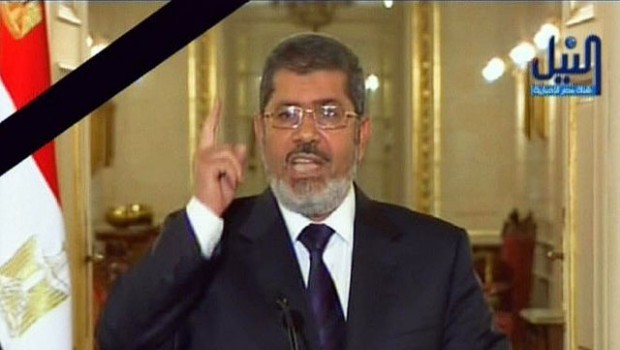
Image grab taken from NILE TV shows Egyptian President Mohamed Morsi giving an address on January 27, 2013 (AFP PHOTO)
Cairo, Asharq Al-Awsat–Protesters and police in Egypt continue to clash for a fifth day, despite a presidential state of emergency declaration in three provinces hit hardest by the violence.
Yesterday, Egyptian President Mohamed Mursi declared a month-long state of emergency in three cities on the Suez Canal, where dozens of people have been killed in protests that have swept the entire nation and deepened a political crisis facing the Islamist leader.
Hundreds of demonstrators in Port Said, Suez and Ismailia turned out against the decision within moments of Mursi’s announcement late on Sunday that came after the death toll from protests and violence that erupted last week hit 49 people.
Most deaths were in Port Said, where 40 people were killed in just two days. Riots were sparked on Saturday when a court sentenced to death several people from the city in a case of deadly soccer violence last year. Mourners at Sunday’s funerals in the port, where guns are common, turned their rage on Mursi.
In Cairo, Police again fired volleys of teargas at dozens of youths hurling stones early on Monday near Cairo’s Tahrir Square, where opponents have camped for weeks to protest against Mursi, who they say betrayed the revolution that overthrew Hosni Mubarak two years ago.
“We want to bring down the regime and end the state that is run by the Muslim Brotherhood,” said Ibrahim Eissa, a 26-year-old cook, protecting his face from teargas wafting towards him from police lines near Tahrir, the cauldron of the 2011 revolt.
Propelled to power in a June election by the Brotherhood, Mursi’s presidency has lurched through a series of political crises and violent demonstrations, compounding his task of shoring up a teetering economy and preparing for a parliamentary election to cement the new democracy in a few months.
“The protection of the nation is the responsibility of everyone. We will confront any threat to its security with force and firmness within the remit of the law,” Mursi said, offering condolences to families of victims in the canal zone cities.
Appealing to his opponents, the president called for a national dialogue on Monday at 6 p.m. (1600 GMT), inviting a range of Islamist allies as well as liberal, leftist and other opposition groups and individuals to discuss the crisis.
Meanwhile, the Obama administration continues to grow weary of the Mursi-led government. The White House last summer had hoped to smooth over some of the traditional tensions between Washington and the Brotherhood, a party rooted in opposition to Israel and the U.S., but a spate of recent steps — from Brotherhood-led attacks on protesters, to vague protestations of women’s freedoms in the nation’s new constitution, to revelations of old comments by Mursi referring to Jews as “bloodsuckers” and “pigs” — have raised alarm among senior U.S. officials and threatens $1 billion in American aid to Egypt.
The White House is increasingly concerned about the direction the Brotherhood is taking Egypt: “It’s not just about majority rule,” the administration official told the Associated Press. “There are democratic principles that we continue to support.”
Mursi’s anti-Semitic comments, made in separate speeches in 2010 but which surfaced this month on Egyptian TV, also accused Obama of being a liar. They shocked U.S. officials who sprang to condemn them as counter-productive to American-supported peace efforts in the Mideast. But they surprised few people in Egypt, who have heard Brotherhood officials make similar statements for years.
Mursi initially struggled to respond to the U.S. backlash from the comments. His office issued a statement committing to uphold religious freedoms and tolerance, and condemning violence.
“The president strongly believes that we must respect and indeed celebrate our common humanity, and does not accept or condone derogatory statements regarding any religious or ethnic group,” the statement said, without addressing the fact that Mursi himself made those comments.
The statement, however, did little to soothe U.S. lawmakers — Democrats and Republicans alike — who have balked at approving $1 billion in aid to Egypt that Obama promised in 2011 to help the new government settle an economic crisis that has drained the country’s central bank and devalued the local currency in the revolution’s aftermath.
